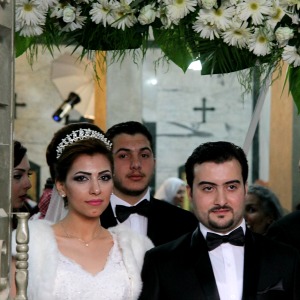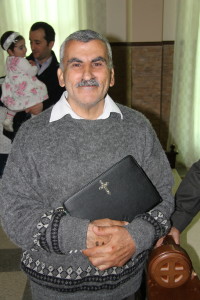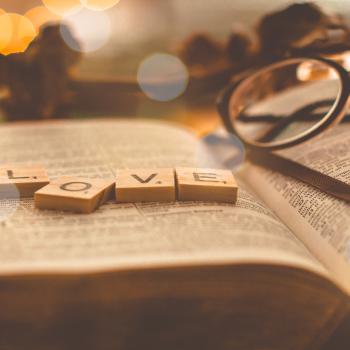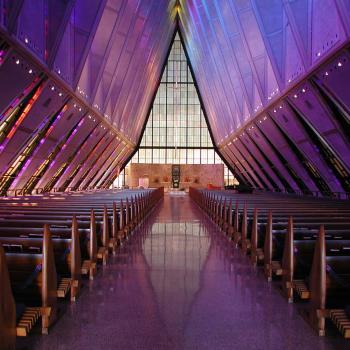We read the reports and hear the news. The church’s influence is waning. The tide of culture is crashing, sweeping our morals, our structure, and our ability to have impact in the world. No longer dominant, no longer in control, Christians are shrinking to minority positions.
And in that vacuum, the opposition is coming in. We see it in our culture, with laws and regulations that run counter to our beliefs. We see the state take the minds of the children away from their “fundamentalist” children and school them in the proper secularist society.
And true persecution marches on through many places in our world with beheadings, rapes, and enslavement of Christians for their faith.
Despite the bad news, I think these days may one day be viewed with reverence. This could be the dawn of a great awakening. It happened once in the town of Kerak Jordan…
Every Christian family was removed
We drove through this town with cement homes and broad smiling faces. Occupied since the 9th century B.C, Kerak is a town known for its towering Crusader castle, one of the largest still standing. It stands as an ominous sign of the back-and-forth struggle between Muslims and Christians going back generations.
Our group of writers were invited to interview the local Catholic priest. “But only for 20 minutes, because I have a wedding to perform.”
We were uncomfortable with the imposition, but he insisted not only that we talk to him, but we also stay for the wedding. It was amazing. Full of joyous celebration and women throwing ulalations, I didn’t understand a word of the service, but I understood the meaning and implication. Two Christians — joining under God. Continuing their faith in marriage.
The town of Kerak has about 65,000 residents and many of them are Christians, one of the highest percentages in Jordan. But the in the middle 1800’s the town had an interesting upheaval.
It was the days of the old Ottoman Empire and the tribe that comprised the Christian minority was in the middle of a struggle. Many lives were lost until the prevailing government authority stepped in and removed the 90 Christian families for their own safety. A few sympathetic Muslim families went with them.
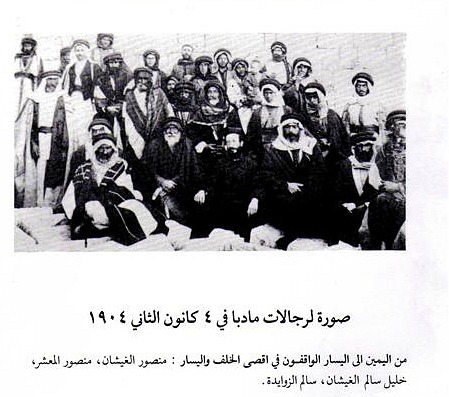
They were given choices: Go to Syria. Or they could have boarded a boat and been relocated to South America. But they chose to stay in their own country and were moved to Madaba, an ancient Moabite town. It was sacked by the Persians in 615, and the earthquake of 747 completed its ruin. It stood abandoned for more than 1000 years until these Christian families settled here. It was they, in the process of rebuilding, who began to find hundreds of rich mosaics buried under the rubble.
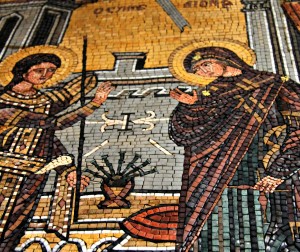
The ancient Babylonians used the multi-colored rock quarries to produce mosaics and tiled art in nearly every corner of the city. The new Christian settlers were encouraged to discover – and preserve these mosaics. People have been uncovering mosaics in the most unlikely of locations. Today, it’s nothing to refinish a floor in a home and during the excavation to find an ancient mosaic floor. And it’s a heritage they are proud of and protect.Now known as the Mosiac City, the town has prospered in tourism, commerce, and peace.
There is an ancient map, dating from the 6th century, which maps out the entire known Middle East. With two million pieces of colored stone, it’s a tremendous finding. I stood over it, amazed at the rich depth of a map that didn’t use satellite technology, rather the tales of travelers and carefully measured landmarks.
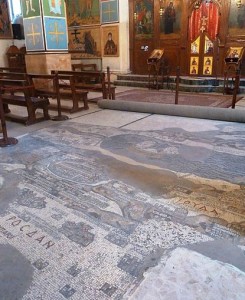
Can we prosper despite persecution?
I’m sure that persecution in the middle 18th century was in no way soft or a little threatening. It came at the edge of an angry sword or a wild-eyed enemy. And for those that escaped death, their fate was forced relocation. To some, to be uprooted from your home and sent to a place that is not yours was a punishment more painful than the dagger.
But in a strange way, God was at work in the middle of this tumult. These families moved and yet they still prospered. And this new town of Madaba has some farm land and it had some rocks. ”We could make something here!” 150 years later, I was able to see a town that had made it. And I’ve met a number of people who claim a heritage to this town who are impacting the world.
All of this is because of a painful time and a literal uprooting.
What about the wandering Jew?
I think about the Jews – persecuted as no other religious group. In every culture, in every land they have been minimized, persecuted, and marginalized. But they stick to their ways, trust their God, and cling to their families. And they not only survive, but thrive.
And we love to cherry-pick promises about faith and love and children. But how about this one?
“If the world hates you, you know that it hated Me before it hated you. If you were of the world, the world would love its own. Yet because you are not of the world, but I chose you out of the world, therefore the world hates you. Remember the word that I said to you… If they persecuted Me, they will also persecute you… because they do not know Him who sent Me.”
Pray for the persecuted church
I’m not sure if this is any comfort to those who are on the run from ISIS persecution in Iraq, Syria, Yemen, and Nigeria. I’m not sure the father who leads his family across the desert at night is thinking about influence 150 years away. But persecution has a way of making us prioritize what is important in our lives.
I know that “a shaking” is going on. This present terror in the Middle East will not stop there. It will come to our own land, and maybe your backyard.
How deep is your faith? And what would you give up to keep it?


